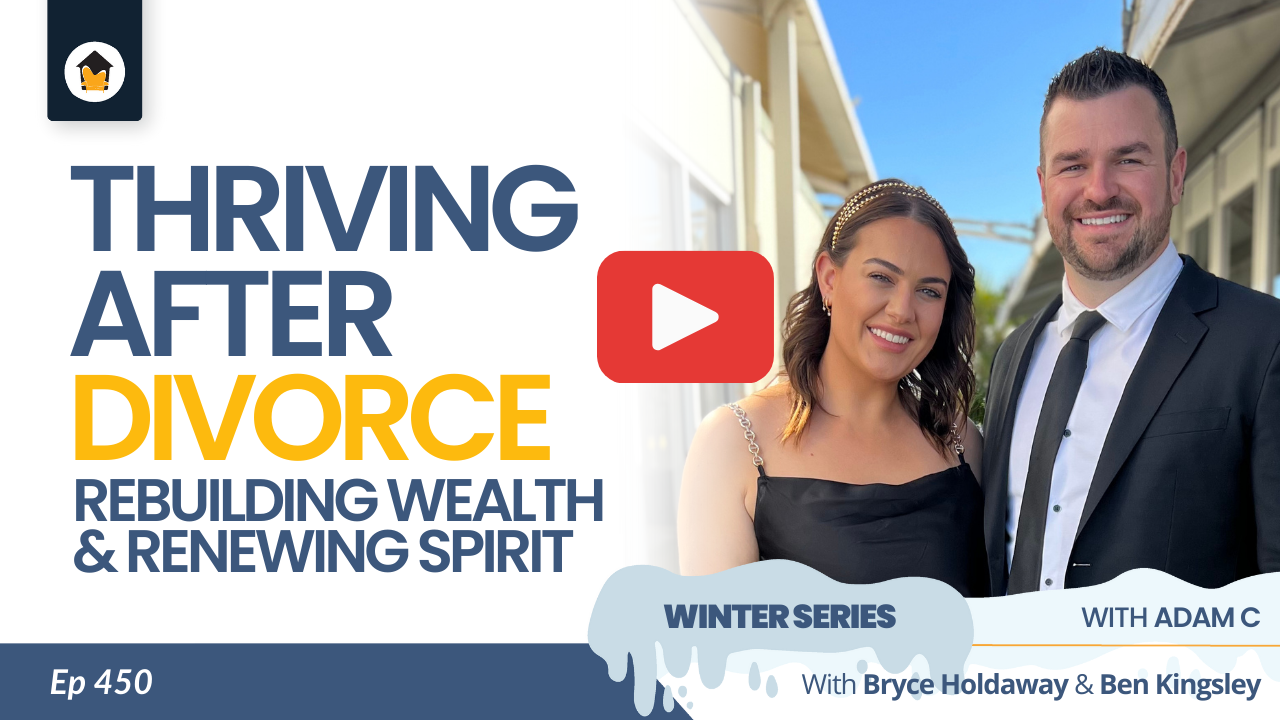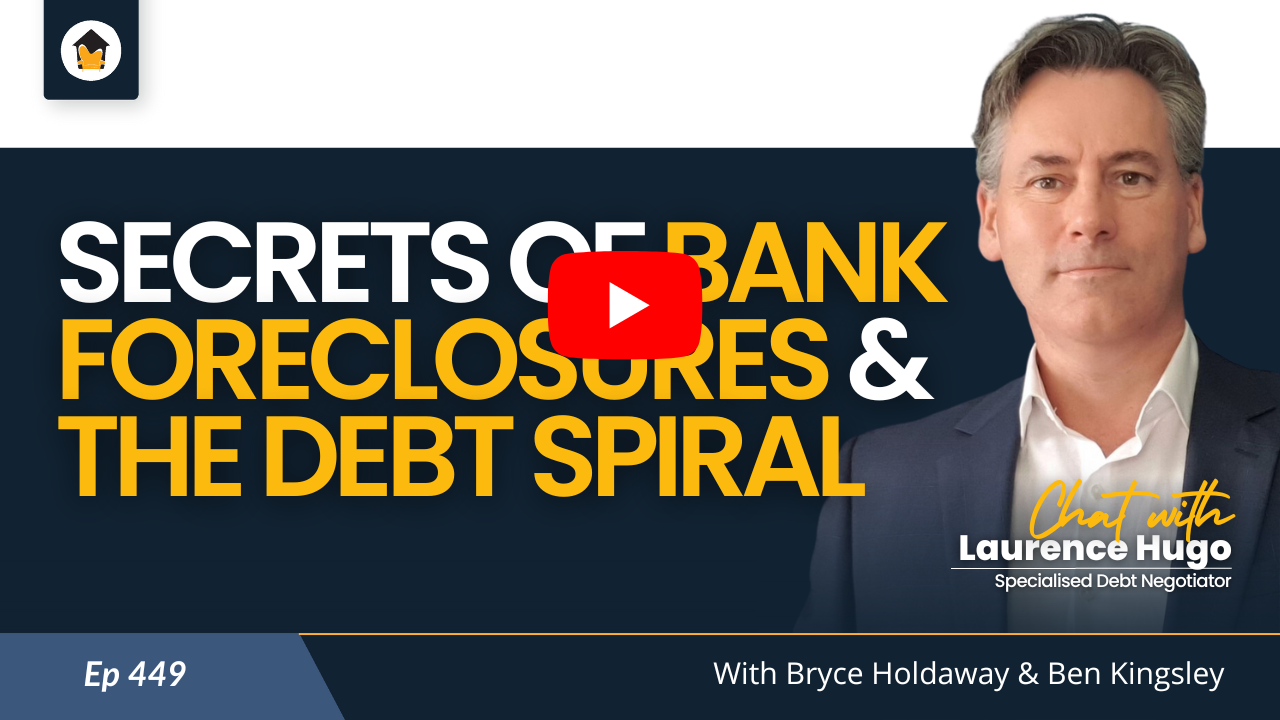Is 64 too old to be starting a property portfolio?
Must your investment property be fully funded by the time one retires?
And why does investing with intention matter – even after you’ve acquired 5 properties?
In today’s Q&A we’re answering these fantastic questions that explore the many layers folks should consider BEFORE they choose to enter or exit the property game.
This episode highlights the importance of planning and intention, from calculating how much you really need (and gaining clarity around your next step) to why you shouldn’t invest in property like stepping stones.
Plus, we have a Listener Tale (or horror story) highlighting why property management matters. Listen now!
Free Stuff Mentioned
- Moorr Webinar: Best Tools for the Job – What to Use When?
7:30pm AEDT, 19 March
Within Moorr, our money management platform, there are currently over 25 features and tools, providing more than 100 different insights! In our webinar we’ll guide you on the best tools for the job and reveal how all your data comes together to give you meaningful insights through our “track your progress” approach to money management. Find out more or reserve your spot >> - Corelogic’s Women in Property Report just released! Read it now >>
- Leave us a Q or share your story with the TPC community!
Leave us a Q for our next Q&A Day (and we’ll give you a free Start & Build course!) or share your property journey and be in our next Winter Series. Send us a voice message now >>
Questions We Answer
Q1) How important is it that an investment property is fully funded by the time you retire? from Richard
Hi Ben and Bryce, Richard here.
I just wanna start by thanking you both for everything that you do for the community. It’s real eye opener and it helps me to get my head in the right spaces.
I look towards everyone my house fully paid off and looking to start my 1st investment, but my question is, I’m 52 just about paying my own property out.
How important is it that an investment property is fully funded by the time you retire, or is it okay if it’s just looking after itself and can continue on for another few years, whilst your in retirement and fund itself in the background, if you can give us any help on that, that would be great.
Thank you.
Q2) Investing at 64 from Ralph
Hi, I just wanna know if I can build a property portfolio at the age of 64. Thank you.
Q3) Multiple IP’s already and wondering what to do next? from Matt
Hi guys, it’s Matt here.
I live down in Torquay, VIC. We have a number of investment properties: 2 in Queensland, 3 Victoria and we own our home.
We own most of our investment properties. There is still a little bit of debt there.
Basically, just looking for a financial plan or some advice as to what to do to move forward. I plan to step away from our business within the next five years and just see whether we can somehow live off the equity.
I basically just want a plan and just maybe get you guys to have a look at our overall situation and offer some advice, and look forward to hear back from you. Bye.
Listener Tale: The Importance of Property Management
Hey Ben and Bryce,
Just wanted to reach out and say Ep. 480. [How to Fail to Retire on $2k per week]
Guys! This is phe . nom . enal ! I can relate to some if not all of the “how to fail to build” points you raised here.
My true story goes a little something like this:
I bought my first house and land package as a PPR just before the GFC hit and after living in it for a year, rented it out because I went off traveling the world in my mid 20s for the next 8/9 years. After the real estate agency secured what I thought was a good tenant, I gave them the flick and managed the property privately. Thought it was a great idea to save a few dollars on fee’s right. Those same tenants moved out 5 years later and I had to replace all the carpets, repaint the walls and replace some fans the kids had swung off of. Needless to say, the bond certainly didn’t cover this. I kept the bond and offered the tenants to pay the rest of the bill. Obviously, I heard crickets from them so had to pay the rest out of my own pocket. I had landlords insurance but this is a worst case insurance for me and I never use it to claim small things. Its just for the “what if the house burns down”.
You’d think I’d learn right? Wrong. I went and got another tenant, funny enough it was the family next door and they were moving out of that house because it was up for sale. I saw an opportunity to save of management fees again and 2 weeks rent the real estate would have charged for finding a new tenant. The new family moved in under a private agreement. Sweet as right? Nope.. after trying to manage this house from a yacht somewhere in the Bahamas (which I worked on btw not owned) I found out while doing my own tax return one year that they had under paid me rent. I had to send them emails and show them spread sheets from a far of how much they were behind and it was more than 5 grand. I thought enough was enough and got a property manager to helped sort them out and they did pay me what I was owed and all was fine.
But do you know what the kicker is, well it’s not keeping up with what the rental market is doing. I.e. rents around my house had gone up and considerably, but because I was managing this house myself from a far I didn’t have the finger on the pulse. After all of this learning, let me tell you fella’s.. I have now learnt! I maintained a property manager for this house from then on.
That lesson had taught me about property management and it’s importance. What it didn’t teach was having the right strategy in place, and so I sold that house at roughly the 10 year mark (insert palm in face emoji).
I can whole heartly say that the net of the money I
saved in management fee’s over the years was surely a net negative and as you can see to top it off I sold the property and paid commission to do so. I can’t bring myself to check the growth of that suburb and what the house would be worth now or event to check what it’s rental yield would be. For context I sold it in 2022.
Final point I’ll make on this and for people who may read this, I wish I got accredited professional help because my future self would have thanked me for it. My wife and I have now got that help through Empower Wealth and we are on a path of retribution.
I am a dedicated listener to your podcast. Keep up the great work!
You guys are my Joe Rogen!
Cheers Trev.
Timestamps
- 0:00 – Must the Plane Have Landed BEFORE I Retire?
- 1:39 – The lengths we go through, Moorr webinar & a listener message!
- 7:29 – Mindset Minute: Rich vs Poor Mindset
- 12:17 – Q1) How important is it that an investment property is fully funded by the time you retire?
- 14:13 – If you wait, you rob yourself of the power of…
- 15:47 – We need to understand THIS before we start
- 18:05 – What your investment property should look like in retirement
- 19:34 – Why property investing isn’t like stepping stones
- 21:29 – “Strategy has to be informed by cashflow”
- 23:53 – Q2) Investing at 64
- 24:50 – Work back from your needs
- 27:39 – Considerations for older investors
- 28:13 – Why market cycle timing is important
- 30:13 – Access to funding & lenders
- 34:41 – Q3) Multiple IP’s already and wondering what to do next?
- 35:42 – Why intention matters!
- 36:42 – Should Matt live off equity?
- 38:46 – How to figure out what is possible
- 39:49 – When rates or costs of living go up, how does it affect a Living Off Equity strategy?
- 41:57 – This is a perfect “What if” example
- 44:06 – The 4 Expense Categories
- 45:59 – What living off equity means
- 46:45 – Listener Tale: The Importance of Property Management
- 50:42 – You either pay with money or time!
And…
- 52:13 – Lifehack: With or Without Me energy
- 55:22 – WMPN: Moving the dial for women!

 Subscribe On Itunes
Subscribe On Itunes Subscribe On Android
Subscribe On Android


